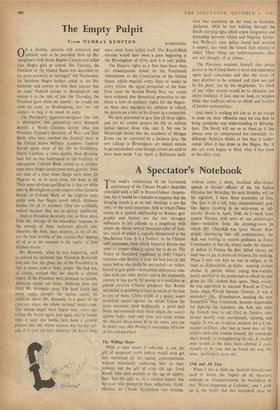A Spectator's Notebook
THIS week's celebrations of the fourteenth I anniversary of the Chinese People's Republic coincided with a lull in Russo-Chinese vitupera- tion, but it would be a mistake to suppose that the slanging match is at an end. Ideology is not the only, or the most important, field in which China stands in a special relationship to Russia; geo- graphy and history are the two strongest influences in her attitude to a neighbour with whom she shares several thousand miles of fron- tier, much of which is vaguely demarcated as the MacMahon Line. It is a frontier, as the Chinese well remember, with which Imperial Russia was wont to tamper when it suited her to do so. The Treaty of Nerchinsk regulated, in 1689, China's relations with Russia; it took the best part of 200 years before she could be persuaded—or rather, forced at gun point—to establish diplomatic rela- tions with any other power; and in the nineteenth century it was partly by posing as a mediator or patron vis-à-vis Chinese predators that Russia succeeded in grabbing at least as much of the loot as any of them. China could, at a guess, assert territorial claims against the Soviet Union far more extensive (and incidentally a good deal better documented) than those which she asserts against India. And next time you come across the obscure place-name Ili in the news, you can be pretty sure that Peking is reminding Moscow of this awkward fact.










































 Previous page
Previous page